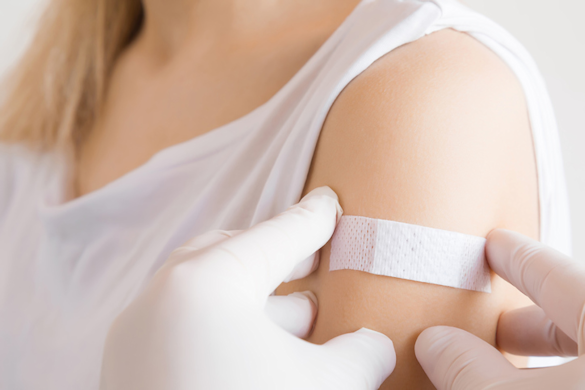
Students are being encouraged to make sure their vaccinations are up to date for measles, mumps, rubella and meningitis.
There are two recommended vaccinations for University students:
Most students have been vaccinated as part of the UK schools programme. However, if you have not been vaccinated against mumps, measles and rubella, or meningitis, or you are not sure, it is important you contact your GP and arrange to receive the vaccines.
Meningitis ACWY vaccination
Meningitis and septicaemia (blood poisoning) are rare but life-threatening diseases. They are caused by several groups of meningococcal bacteria – the most common types are A, B, C, W and Y.
Having the MenACWY vaccine in addition to the MenC vaccine, which many people received in childhood, will not only give you better protection against MenC infection but will also protect you against the other three meningococcal groups (A, W and Y).
A free MenACWY vaccination is available for any unprotected individual under 25 years of age.
Symptoms of Meningitis
Meningitis is comparatively rare, but it is important to be aware of the symptoms and be prepared to take urgent action whenever it is suspected, as it can develop suddenly and progress rapidly.
- A high temperature
- Being sick
- A headache
- A rash that doesn’t fade when a glass is rolled over it (this may appear later or not at all – don’t wait for a rash to appear before seeking urgent medical attention)
- A stiff neck
- A dislike of bright lights
- Drowsiness or unresponsiveness
- Fits (seizures)
Students are also encouraged to look out for their friends, particularly if they go to their room unwell.
Measles, Mumps and Rubella (MMR) vaccination
Measles, mumps and rubella are highly infectious conditions that can have serious and potentially fatal complications.
There has recently been an increase in cases of measles and mumps across England, particularly amongst groups who have not been vaccinated or have just had one MMR immunisation (rather than the recommended two doses).
The MMR is a safe and effective combined vaccine that protects against all three separate illnesses. It is administered in a single injection, requiring two doses at least 4 weeks apart. Most students will have received one MMR immunisation as a child but may not have had the second booster.
Widespread vaccination protects, not just the individual, but also those who are unable to receive the vaccine because of a weakened immune system, by avoiding the spread of the conditions.
It is strongly advised that students who have not previously had TWO doses of the MMR vaccine, or who are not sure, to contact their GP as soon as possible to arrange to have the free vaccination.
Symptoms of measles, mumps and rubella
Symptoms of measles: Runny or blocked nose, sneezing, swollen eyelids, sore eyes that may be sensitive to light, a high temperature, greyish-white spots in the mouth, aches and pains, a cough, loss of appetite, irritability and a general lack of energy.
Symptoms of mumps: Swelling of parotid glands, headache, joint pain, feeling sick, dry mouth, mild abdominal pain, feeling tired, loss of appetite, a high temperature.
Symptoms of rubella: A red-pink skin rash made up of small spots, aching fingers or wrists or knees, a high temperature, cough, sneezing and runny nose, headaches, a sore throat, sore and red eyes.
How to get vaccinations
Visit your usual GP or contact Brownlow Health. If you haven’t registered with a GP in Liverpool yet, make sure you contact Brownlow Health by visiting the practice or calling 0151 285 4578 as soon as possible to register. If you are eligible, you will be able to have the vaccinations free of charge.